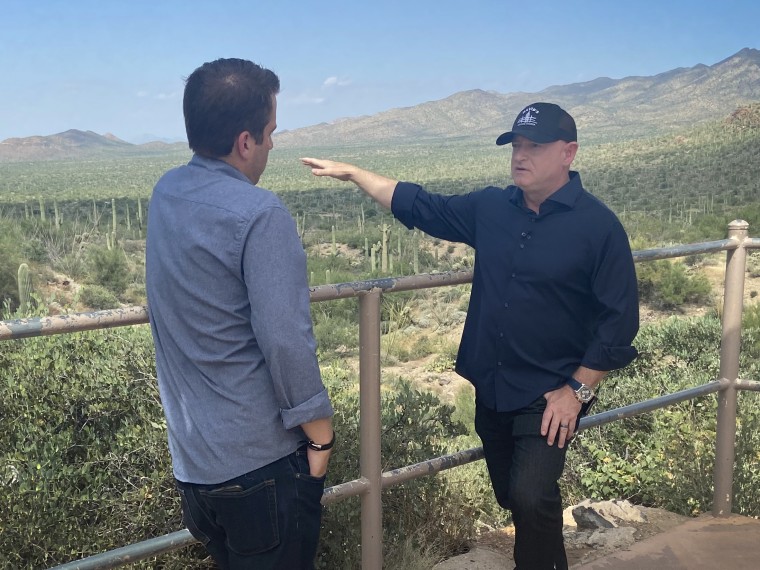LAS VEGAS — The face of climate change here is visible in a big warning notice left on a front door by a water inspector making daily rounds.
“Most violations, we come back in two weeks to see if they’ve corrected the issue,” wastewater inspector Cameron Donnarumma told NBC's “Meet the Press Reports.” “If not, that would be where a fine would come in.”
Broken sprinklers, unplugged leaks or watering the plants on days that’s not approved by the local authorities can leave residents with lighter wallets. Fines start at $80 and double for repeat offenses. Donnarumma, who works for the Las Vegas Valley Water District, said patrols run seven days a week.
Residents might not enjoy getting a nudge from authorities about their garden hoses, but the work is getting more deadly serious each year as temperatures rise and water becomes harder to come by.
Explosive storms and raging wildfires have focused attention on climate change this year, but residents in the Colorado River basin states are also experiencing more slow-moving disasters. They’re in the middle of a megadrought that scientists say may be the worst in over a thousand years.
In August, the federal government declared a shortage along the Colorado River, which provides water for residential use, farmland and power plants throughout the Southwest. Nevada and Arizona are required to cut their water use in response to the order, the first of its kind. If the drought gets worse, and there’s no sign of it letting up, California will follow next.
“It's our biggest long-term national security issue,” Sen. Mark Kelly, D-Ariz., told NBC News in his Tucson home. “I just had a grandkid. My granddaughter was born 3 1/2 months ago. You know, she is going to be around in the year 2100. What does the state of Arizona look like?”

The drought was at the front of Kelly’s mind when he worked on a bipartisan infrastructure bill this year, which he said he hopes will fund projects to repair canals and aqueducts to reduce water leakage, if it passes the House. He also wants to hold a hearing on the state of the Colorado River.
The impacts of the megadrought are profound. The water, much of it collected from melting snow, powers the Hoover Dam and Glen Canyon Dam. Already, the Hoover Dam is operating at 25 percent below its operating capacity thanks to Lake Mead’s depleted levels.
“It is one thing to see this kind of thing on paper,” said Kristen Averyt, the Nevada state climate policy coordinator and a UNLV research professor. “There's a time that you really wish you were wrong, and unfortunately we were right. This is precisely the kind of thing that we've expected all along with respect to climate change.”
For farmers, it means planting fewer crops, raising less livestock and paying higher premiums on water, which leads to reduced yields and higher prices for customers.
“If you don't have rain, you don't have cows. If you don't have feed, you can't have cows,” Lori Sturgill, an Arizona rancher, said. “And so it all boils down to the rain and the water.”
Drought also means less water for personal use and recreation, which is why those Las Vegas water inspectors have become so zealous in cracking down on houses with thirsty grass lawns.
The state recently enacted a law that will make close to one-third of all grass around Las Vegas illegal. The city has already managed to reduce water consumption in the Vegas area by over 20 percent since the drought began, even as the population increased.
The situation is serious enough that Donnarumma, the inspector, said he gets encouragement from local residents.
“A lot of people do stop us and say, ‘Hey, thanks for what you’re doing,’ you know,” he said. “They understand the situation with Lake Mead and with the Colorado River.”
Cal Perry and Kailani Koenig reported from Las Vegas and Phoenix. Benjy Sarlin reported from Washington.
To learn more about the challenges to our water supply from climate change and the solutions on the table, watch the latest episode of "MTP Reports," streaming now on Peacock.

